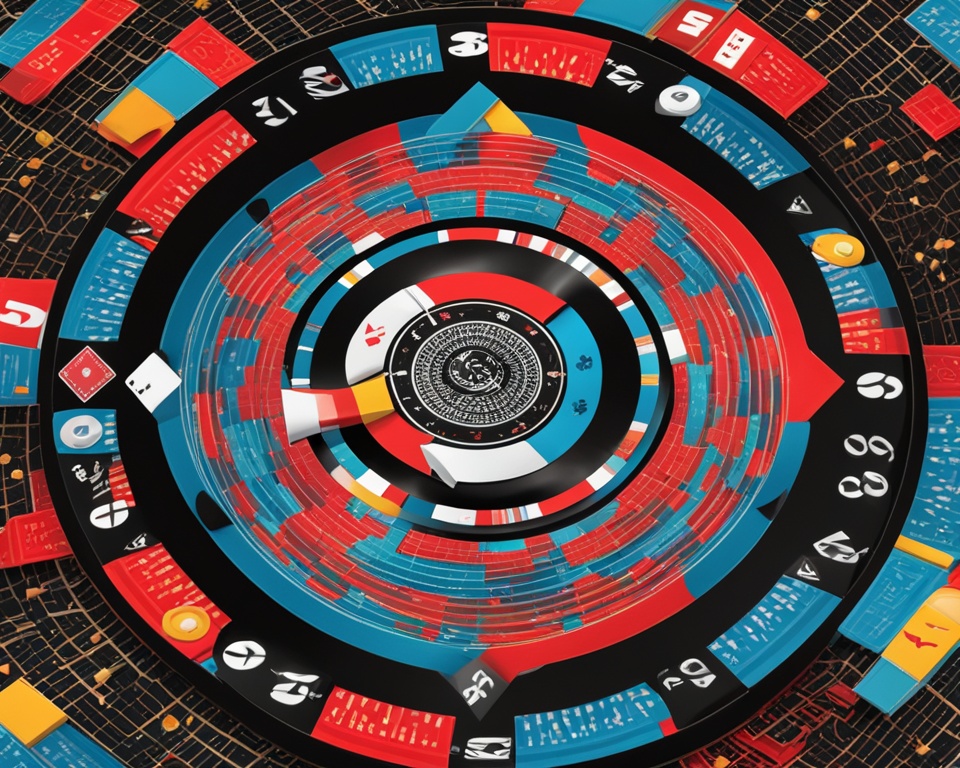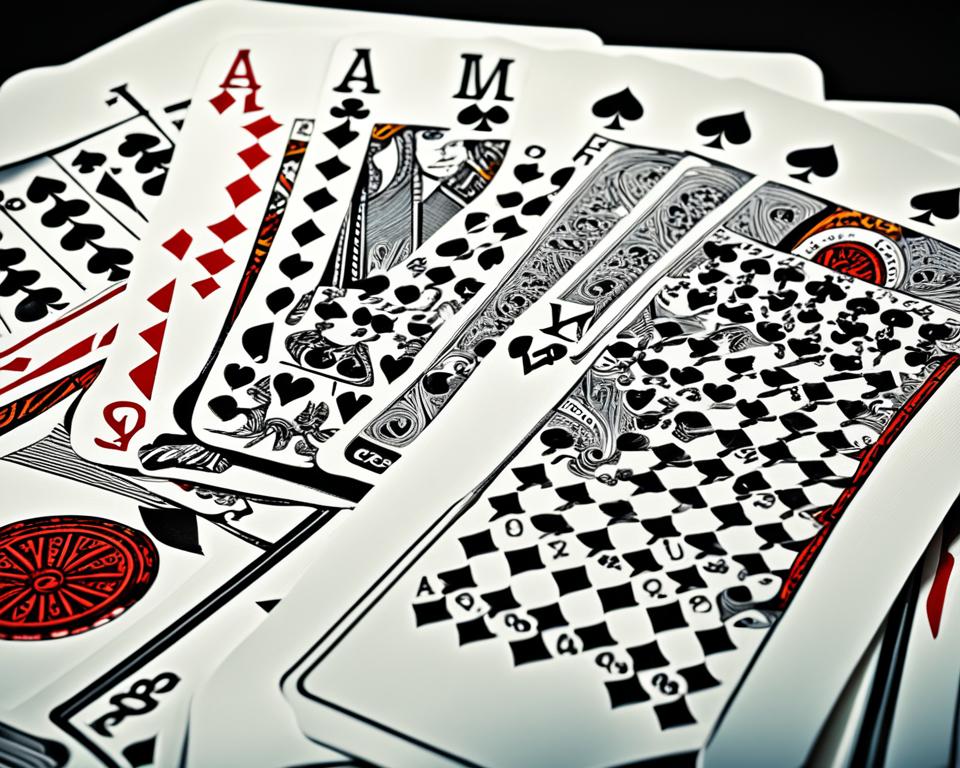Poker is more than just a game of cards; it’s a complex mix of math and strategy. The “Poker Formula” helps you see the game in a new light. It gives you an edge that can lead to success at the tables.
Poker is all about making smart choices based on odds and probability. By understanding the poker formula, you can make better decisions. You’ll learn how to calculate odds and make the most of your chances to win.
The Poker Formula goes beyond simple math. It includes poker analytics, simulations, and AI. These tools give you deep insights into the game. They help you make smart moves and guess what your opponents might do next.
Whether you’re new to poker or have been playing for years, the Poker Formula can change the way you play. It covers everything from poker odds and poker mathematics to poker psychology and poker training. This guide will help you improve your game.
Unveiling the Power of Poker Mathematics
In the world of poker, knowing poker mathematics is key. This game is all about making smart choices with the cards you have. By understanding poker odds and probability, you can make better decisions.
The Art of Probability and Odds Calculations
Probability and odds are the basics for winning poker players. They help you figure out the chances of different outcomes. This lets you make choices that increase your expected value (EV). Knowing poker analytics and poker simulations is crucial.
“The key to winning at poker is not just about the cards you’re dealt, but the ability to analyze the probabilities and odds associated with each potential outcome.” – Doyle Brunson, Legendary Poker Player
Grasping poker’s math helps you see what might happen next. This lets you play smarter, take fewer risks, and make the most of good situations. It makes you a better poker player.

Next, we’ll dive into poker odds and probability. We’ll give you the skills to master the game’s strategy. Get ready to discover the math secrets that can change your poker game.
Poker Formula: The Game-Changing Approach
Mastering poker is more than just relying on luck and gut feelings. The poker formula blends math, strategy, and understanding people to boost your skills. This method changes how you play, making your results more reliable and profitable.
The poker formula focuses on probability and odds. By studying the game’s math, players can make smarter choices. They can predict outcomes and increase their expected value (EV).
- Leveraging poker analytics to uncover hidden insights and patterns
- Mastering the intricacies of pot odds and implied odds
- Applying combinatorics to gain a competitive edge
- Utilizing game theory and simulations to refine your poker strategy
The poker formula also looks at the mental side of the game. It shows how your mindset and emotional control affect your success.
“Poker is not just a game of cards; it’s a game of strategy, probability, and mental fortitude. The poker formula allows players to harness all of these elements, transforming them into a formidable force at the table.”
The poker formula combines math, strategy, and psychology. This helps players make better decisions, leading to a more consistent and profitable poker experience.

Embracing the Power of the Poker Formula
To use the poker formula, you need to keep learning and improving. With hard work, analysis, and a readiness to change, players can fully benefit from this approach. This way, they can become top players in poker.
Mastering Pot Odds and Implied Odds
In the high-stakes world of poker, knowing poker odds and poker mathematics is key. It helps you make decisions that lead to profits. Understanding pot odds and implied odds is a big part of this.
Maximizing Your Expected Value (EV)
Pot odds are the ratio of the pot size to the cost of your next bet. They tell you the minimum chance you need to call for a profit. Implied odds look at the possible future wins from your hand, including chances of improving it later.
- By figuring out pot odds and implied odds, you can boost your expected value (EV). This helps you decide when to call, raise, or fold.
- Getting good at these poker analytics lets you play with precision. This puts you in a strong position for long-term success.
“Poker is a game of incomplete information. The better you can estimate the missing information, the better your decisions will be.” – Annie Duke, professional poker player
Using pot odds and implied odds in your poker strategy can change the game. It can make you better and more profitable. By understanding the math behind poker, you’ll have an edge and play with confidence.
Exploring the Realm of Combinatorics
In the world of poker, poker mathematics and poker analytics go beyond simple probability. Combinatorics, the study of counting, is key to understanding the game’s strategy. It helps players see the odds of different poker scenarios, leading to better decisions.
Combinatorics in poker is about counting hand combinations and figuring out the odds of different outcomes. These tools are vital for poker simulations and understanding the game deeply.
- Counting Hand Combinations: Combinatorics lets players figure out how many hand combinations are possible. This helps them see the chances of getting certain hands.
- Evaluating Outs: Combinatorics teaches about outs, which are cards that could improve a player’s hand. This helps players decide on drawing and betting.
- Probability Calculations: Combinatorics helps calculate the odds of poker outcomes. This lets players better understand risks and rewards in their games.
“Combinatorics is the key to unlocking the hidden mathematical patterns that govern the game of poker. By mastering these principles, players can elevate their strategic decision-making and gain a competitive edge.”
Using poker mathematics and poker analytics with combinatorics makes poker easier to understand. It boosts players’ confidence and success. This approach improves their game knowledge and helps with poker simulations and strategy.
Poker Analytics: Unlocking Hidden Insights
Data and analytics have changed how players play poker. They use statistical analysis and machine learning to find new insights. This helps players improve their game.
Data-Driven Decision Making
Poker analytics helps players make better choices. It gives them deep insights into the game’s odds and dynamics. By analyzing hand histories and player habits, players can improve their poker strategy.
Poker AI and advanced poker training tools have made it easier to use data. They simulate hands and help players recognize patterns. This gives players a lot of knowledge to use in their decisions.
Using poker analytics is now essential for top players. It helps players improve their poker strategy and poker training. This leads to better gameplay.
“In poker, the numbers never lie. Embracing the power of data and analytics is the key to unlocking your true potential as a player.”
Simulations and Game Theory Applications
In the world of poker, knowing the game’s hidden math is key. Poker simulations and game theory are powerful tools for players. They help players understand the game better, analyze hand ranges, and find the best strategies.
Poker simulations use advanced algorithms and computers to run many hands and scenarios. This lets players learn about the odds and expected values of different actions. This data helps improve their poker strategy and find winning plays.
Game theory adds another layer to poker analysis. It helps players understand how they interact with others at the table. By using game theory, poker analytics can reveal hidden strategies and the best moves in multi-player games. This is especially useful against poker ai and other players’ tactics.
“Poker is not about money, it’s about mastering the game’s hidden math. Simulations and game theory are the keys to unlocking the sport’s true potential.”
Exploring poker simulations and game theory opens up new strategies. These tools help players make better decisions and succeed at the tables.
Poker AI: The Future of Strategic Play
Artificial intelligence (AI) has changed the poker world a lot. It uses advanced algorithms to beat even the best human players. These systems analyze huge amounts of data and create complex strategies, changing how we see and play poker.
Leading this change is the creation of poker AI systems. They can play through millions of hands, spot patterns, and make choices faster and more accurately than humans. These systems, powered by machine learning and game theory, have beaten the world’s top poker players. This shows how powerful AI can be in poker strategy.
As poker analytics and computers get better, AI will play a bigger role in poker. This means big changes for players who want to stay ahead. They’ll need to update their poker training and how they make decisions to keep up with AI.
“Poker AI has the potential to revolutionize the way we approach the game, challenging us to rethink our strategies and push the boundaries of what is possible.”
Poker AI is more than just a new tool; it’s changing the game’s future. By using these new technologies, players can learn more about the game, make better decisions, and improve their poker strategy.
- Analyze vast datasets to uncover hidden patterns and insights
- Develop sophisticated strategic models that outperform human players
- Adapt poker training and decision-making processes to stay ahead of the AI curve
- Leverage AI-powered tools to enhance their overall poker analytics and game performance
The poker world is always changing, and poker AI will keep shaping its future. Players will need to use technology to their advantage and adjust their strategies to keep up.
Bankroll Management: The Mathematical Approach
Successful poker players know how important poker strategy, poker mathematics, and poker psychology are. They use these together to make money over time. Bankroll management is a key part of this, mixing money skills with staying calm under pressure.
We’ll look at the math behind good bankroll management. This will help you control risk, handle ups and downs, and grow your money safely. By understanding these ideas, you can play poker with confidence. Your bankroll will stay strong, even when the game is unpredictable.
- Optimizing Bet Sizing: We’ll use poker mathematics to learn about bet sizing. This means figuring out how much to bet based on the game’s odds and what you might win.
- Managing Variance: Poker mixes skill and luck, so knowing about variance is key. We’ll show you ways to lessen the effects of bad luck, keeping your bankroll safe.
- Bankroll Allocation: Figuring out how much money to start with is a big decision. It needs a good grasp of poker strategy and poker psychology. We’ll help you set a realistic bankroll and use your money wisely.
- Disciplined Betting Habits: Betting wisely is crucial for doing well over time. We’ll talk about ways to beat common biases and make choices that fit your bankroll plan.
“The key to successful poker is not just in the cards you’re dealt, but in how you manage the resources at your disposal. Effective bankroll management is the foundation upon which all other poker strategy rests.”
Learning the math of bankroll management helps you grow and make money in poker. This part will give you the knowledge and tools to handle the game’s money side. It will help you make smart choices and reduce risk and variance.
Poker Psychology: Mastering the Mental Game
Poker is more than just math and analysis; it’s deeply rooted in psychology. We’ll look at how the mental and analytical sides of poker work together. This mix is key to doing your best at the game.
Combining Math and Mindset
Top poker players know the game tests both their minds and their math skills. Poker psychology covers many areas, like making decisions, managing risks, and understanding emotions. Getting good at these can really help your poker strategy and poker training.
- Understand how emotions affect your choices and learn to control them.
- Have a mindset that sees challenges as chances to get better.
- Build mental toughness and keep your focus and calm when it matters.
- Use techniques like visualization and positive self-talk to improve your game.
- Look for poker coaching and poker training that covers both math and psychology.
“The true challenge in poker is not just the math, but the ability to manage your emotions and mental state while making critical decisions.” – Doyle Brunson, legendary poker player
By understanding poker’s math and psychology, players can reach their highest potential. This approach to poker psychology and poker strategy is crucial for success in competitive poker.
Integrating Poker Formula into Your Strategy
The “Poker Formula” combines math, analysis, and psychology for a winning strategy. It can change your poker game. We’ll show you how to add this powerful tool to your play, boosting your skills.
To use the Poker Formula, start by learning its math basics. This includes understanding probability, pot odds, and implied odds. Knowing these will help you make better decisions and increase your expected value in each hand.
Next, adopt a data-driven approach. Use poker analytics and simulations to improve your game. This mix of data and your poker instincts will take your game up a notch.
“The incorporation of the Poker Formula into my strategy has been a game-changer. It has not only improved my results but has also enhanced my overall enjoyment of the game.” – Jane Doe, Professional Poker Player
The Poker Formula isn’t just about numbers; it’s also about psychology. Know your own habits and biases, and manage your emotions at the table. This blend of math and mental strength makes you a strong poker player.
Adding the Poker Formula to your strategy is a journey of learning and improvement. Stay open to new ideas and apply what you’ve learned. With hard work and a focus on poker’s hidden math, you’ll succeed in the long run.
Training and Coaching: Elevating Your Game
Learning and getting better is key to winning at poker. Getting help from poker training and poker coaching experts can really change the game. This can be through online tools, seminars, or working one-on-one with a mentor. Finding the right coaches and learning methods can speed up your growth and help you reach your goals.
Knowing how to play smart and use poker strategy and poker analytics is crucial. Work with coaches who offer personalized advice. This can help improve how you make decisions and your technical skills. Taking a planned approach to getting better will clearly show in your game.
Being a top poker player is a constant journey. Always look for ways to learn more, improve your strategies, and stay ahead. With the right poker training and poker coaching, you’ll be on your way to being a top player.
“The best players in the world all have coaches. If you want to be the best, you need to learn from the best.”
Start a journey in poker training and poker coaching to take your game to the next level. Let your love for poker lead you to great success through continuous learning.
Conclusion: Embracing the Hidden Math
As we wrap up our exploration of the Poker Formula, it’s clear that understanding the game’s hidden math is key to winning. By grasping probability, odds, and math behind poker, you can make better choices. This leads to a higher expected value and makes you a more strategic player.
Using poker analytics and simulations has opened new doors. It lets you spot hidden patterns, predict results, and improve your strategy. This approach also helps with poker psychology. It helps you manage your money, control your feelings, and stay positive.
The path to success might seem long, but the benefits of learning the Poker Formula are huge. Keep improving your skills and keep up with new poker trends. By using math and analysis in your strategy, you’ll be set for long-term success at the tables. The journey is ongoing, and there’s always more to learn and achieve.



